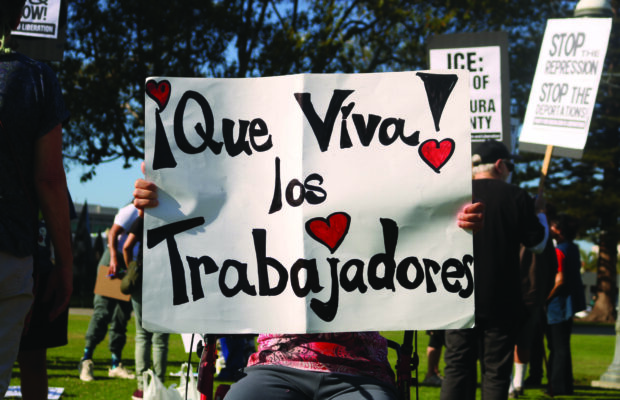Students address concerns about new deportation policies

Names indicated with asterisks are pseudonyms for individuals who prefer anonymity due to concerns for their safety.
As deportation rates increase in the U.S., many Ventura County students have encountered Immigration and Customs Enforcement [ICE] on and off school grounds.
ICE was established in 2003 by the Bush administration as a part of the U.S. Department of Homeland Security [DHS] in response to the 9/11 terrorist attacks.
The Obama administration deported 3.16 million immigrants in its first term, focusing the DHS’s resources on border security rather than counterterrorism. The Trump Administration continued this practice, deporting 3.13 million immigrants in its first term.
Under the Biden Administration, President Joe Biden put less emphasis on deportations and narrowed ICE’s priorities to focus on locating undocumented immigrants with criminal records, as opposed to all immigrants.
Since President Donald Trump was elected for his second term, ICE has deported over 17,200 immigrants, a 29 percent increase compared to April 2024. He promoted increasing deportations and ordered an addition of at least 20,000 ICE officers to the DHS. The Trump administration reports plans to remove over 10 million migrants from the U.S.
The Transactional Records Access Clearinghouse for Immigration reports that as of May 18, 43.1 percent of people held in ICE detention centers do not have criminal records and “many more have only minor offenses, including traffic violations.”
ICE stated that in 2024, 90 percent of those brought into ICE custody were Hispanic or Latino. As a poll from 2022 showcased, 21.9 percent of the Ventura population is made up of immigrants and 45.37 percent of Ventura is Hispanic or Latino. As a result, the increased emphasis on deportation is a topic of discussion among students in Ventura County.
For students at Oxnard High School [OHS], ICE trucks patrolling the outside of their campus have become increasingly common since April, according to the socialist activism group, VC Defensa. Eliana Felipe, OHS freshman, hears the frequent buzz of her peers’ encounters with ICE and believes her school is often surveyed due to the large Hispanic population. “I just think it’s really messed up because we’re a very dominated Hispanic school. And while we do probably have some illegal immigrants here, [they’re] not dangerous, because obviously they’re sending their kids [to school] and just living their lives,” Felipe said.
Another OHS student, Jaiden Ortiz, freshman, said that she feels the presence of ICE is not the only change since the new deportation policies were implemented. “[My peers] look at me differently,” Ortiz said. “We [Hispanics] get treated really differently. It’s so disheartening.”
At Rio Mesa High School, students hosted a walkout protesting ICE on Jan. 31. Emma Chambers, freshman, supported the protest and explained how she feels that ICE is causing negative effects in the community. “I feel like it’s totally wrong, we shouldn’t separate families,” Chambers said.
Meanwhile, some NPHS students are facing similar conflicts. Kasia Zapatka, freshman, remembers learning the news that her cousin was deported. “It was a very depressing day. Everyone was sad. I think it definitely made my family a little more scared,” Zapatka said.
Zapatka’s cousin, 30, was deported on April 22. Zapatka’s cousin flew from Argentina to Miami with an official six-month Visa, planning to stay for one month to celebrate Zapatka’s birthday. He was taken into custody from the Miami airport and questioned for two hours, with his cellphone and luggage confiscated. The ICE officers believed he had alternative motives to stay in the U.S. illegally because he traveled alone with a small amount of money. He was deported to Argentina with a five year ban from the U.S. “I felt overall disappointed in the immigration police and how they handled the situation,” Zapatka said.
By the time Zapatka’s family was contacted, her cousin was already being deported. “I hope that this gets better and I hope that this doesn’t happen to other people,” Zapatka said.
Another NPHS student, Claire Charles*, sophomore, is taking precautions with the intent of protecting her undocumented Mexican immigrant parents because she fears their deportation. Charles walks home from school and carpools with friends to limit their time in public. “I’ve been scared for my parents’ safety, because I don’t want them to be taken away. There’s no one else in my family who was born [in the U.S.] besides me,” Charles said.
The topic of deportations goes beyond high schoolers’ discussion. Samantha Smith,* a Thousand Oaks High School graduate, shared how the new policies affect her as an undocumented immigrant. “There is no longer a feeling of safety, even at school or when I go to the doctor,” Smith said. “As an immigrant, you always have a little bit of fear about your status in the country. I think a lot of Americans think that immigrants have a lot of resources at the touch of their fingertips. In reality, most people, at least my family, pay taxes,” Smith said.
Tipu Khan, a doctor from Ventura, feels responsible for keeping clients from ICE. “I’m a physician at Ventura County Medical Center, and we have had ICE show up at our clinics. Luckily, our administration has stepped in and given our leaders some advice on what to do when they show up,” Khan said.
In Ventura County and across the nation, families and individuals in the U.S. are navigating the challenges of rising deportation rates, while others applaud the policies. “I just wish there wasn’t so much division in our country,” Felipe said.
Column: Zoha Konkader
My father’s story is not unique. He came to America over 30 years ago after he received a good job offer in the ever-growing industry of computers. With my mom, they settled first in Austin, Texas and then eventually in California. In their time here, they have built a good life with meaningful jobs, a large community of life-long friends and their own family. But, all of these feats are not special. Millions of people do the same: they come to the United States and build their own lives.
Across our country, mass deportations are taking place. It is more than just moving a person back to “where they belong,” it is destroying the livelihood of thousands of humans who call America their home. These deportations attack both undocumented migrants, but also legal migrants– notably Kilmar Abrego Garcia, who was mistakenly deported to a mega-prison in El Salvador, where he remains to this day. His story is one of many and highlights the fallacies of such practices. In the wake of current events, all immigrants’ futures in the U.S. are now uncertain.
I speak as the daughter of two immigrants who are U.S. citizens when I say there must be empathy for all humans in our country, regardless of how they arrived. It is wrong to condemn all immigrants for the actions of the exception. By the media and government, undocumented migrants have been demonized. Misleading buzzwords surround their stories– “illegal,” “dangerous” and “criminal”– regardless if they are guilty or not. It is ignorant to generalize or make assumptions about “all migrants,” even if others are pushing this rhetoric. There are numerous reasons why some may evade the increasingly difficult and expensive immigration process. Coming here without official papers does not justify being treated as less than human. I believe consideration of one’s circumstances is necessary before condemning one to their lives they have built in America being destroyed. This does not mean that I think that there should be no legal repercussions of undocumented immigration and that there are no ill-intended migrants, but I believe the issue must be approached with empathy for the humans behind the issue.
I used to be okay with hearing of Trump’s statements towards “illegal immigrants.” My sympathies were surface level because as a U.S. citizen, my status in the country was not in danger. I implore others to not give in to their own ignorance. Pay attention to what is going on in our country before it will affect you too. Every day, people’s rights are being infringed; whether that be through the overturning of Roe v. Wade, threats to impede on transgender Americans’ rights or even the defunding of the Department of Education. All around us, our rights that we once took for granted are being violated. It does not end with these deportations– this is just the beginning.



